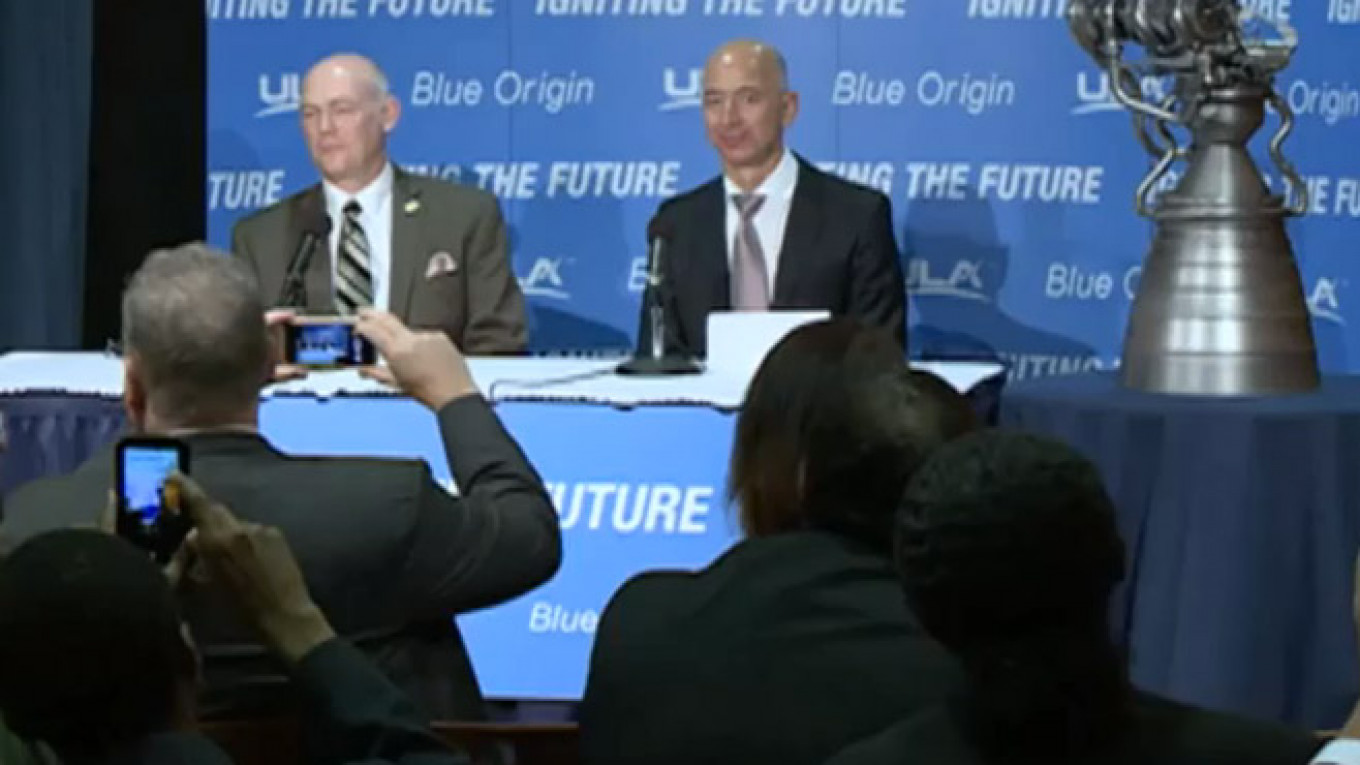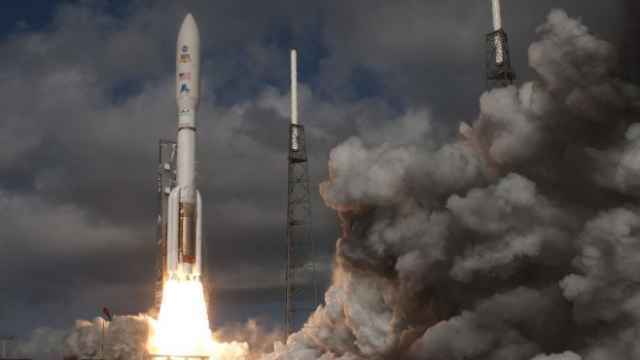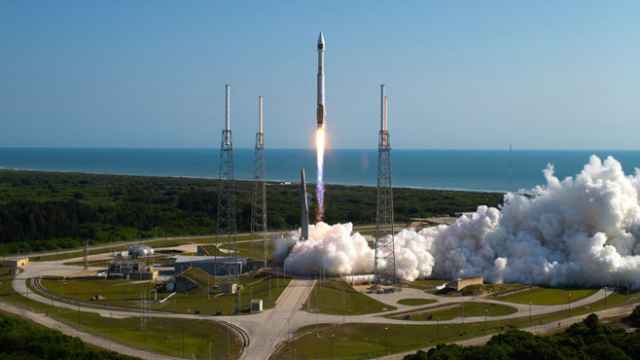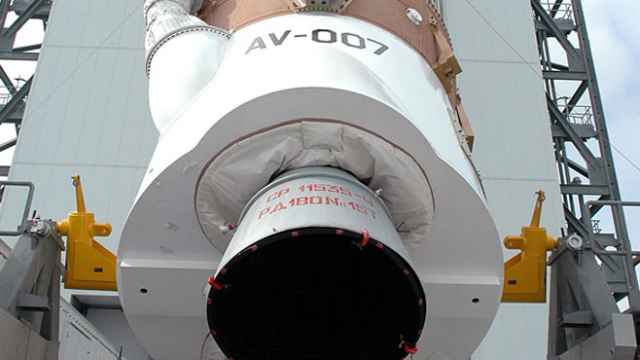In a surprise turn of events, U.S. space industry behemoth United Launch Alliance, or ULA, and Blue Origin — a secretive space startup owned by Amazon-founder Jeff Bezos — have unveiled an American rocket engine that may end Russia's supremacy in the field.
The clash between Russia and the West over Ukraine has injected new life into U.S. efforts to curb its dependence on Russian engines to power U.S. space projects, but few thought a solution would be found quickly.
The development of the engine, known as the Blue Engine 4, or BE-4, will certainly strike NPO Energomash, Russia's premier rocket engine design firm, analysts say.
Introducing the prototype BE-4, Jeff Bezos, the billionaire founder of Amazon and Blue Origin's owner, called it "a big step forward," and said it "accelerated commercial development of the next great U.S.-made rocket engine," in a joint ULA-Blue Origin statement Wednesday.
According to the statement, the BE-4 will be ready for full-scale use in about four years, but the interval may grant only a stay of execution to Energomash — a firm with a rich history and experience in Soviet rocket engine design.
For almost 20 years, ULA has been Energomash's most important customer. Its RD-180 engine, considered to be unrivaled in power and cost, is manufactured exclusively for export to the U.S. launch company.
The sale of RD-180's for use in ULA's Atlas V rocket — the mainstay of the U.S. rocket fleet, which is regularly called upon to lift high-value military and intelligence satellites into orbit — is what keeps Energomash profitable, according to Pavel Luzin, a space industry analyst at the Institute of World Economics and International Relations.
Energomash produced 11 engines in 2013, 8 of which were RD-180s.
These revenue streams have now been jeopardized, perhaps lost, by the larger political currents driving the six-month-old crisis in Ukraine, where the West accuses Russia of supporting separatist militias.
Before 2014, calls for the U.S. to dump the RD-180 fell largely on deaf ears, but the sanctions tit-for-tat over Ukraine has changed attitudes. When Deputy Russian Prime Minister Dmitry Rogozin said in May that Russia would end deliveries of the RD-180 for military launches, Congress responded swiftly, calling for a crash program to develop a domestic replacement. The Atlas V is too important for national security to risk supply disruption, lawmakers said.
Bad News For Energomash
Russian officials have issued contradictory statements about RD-180 engine exports. Although Rogozin has said Russia will limit exports to non-military launches, deliveries appear to have proceeded as usual, with two of the engines arriving in the U.S. in August.
On Monday, Oleg Bochkaryov, deputy chairman of the government's Military-Industrial Commission, told the TASS news agency that the government had no plans to end the sales because it would not be profitable.
Yuri Karash, a space policy expert with the Russian Academy of Cosmonautics, told The Moscow Times that if ULA dumps the RD-180 outright, NPO Energomash would be in trouble.
"It will hurt. NPO Energomash representatives have said termination of RD-180 production would deprive the factory of its most significant source of income," Karash said. "No Russian rockets, including those which may be developed in the future, use the RD-180 engines."
Engines for Russia's new Angara rocket series, which will carry the next generation of Russia's military satellites and commercial payloads into orbit, may have been designed by Energomash, but another organization — the Proton-PM factory in Perm — will produce them in the future, Karash said.
Luzin said the future loss of ULA as a customer could derail the company, which is already struggling financially. Energomash needed to take out a $65 million credit line from Gazprombank in 2013 to finance RD-180 production through 2014.
Energomash in 2013 reported $6 million in profits on revenue of $185 million, Luzin said.
No Hope in Sight?
However, it is not yet clear that ULA will abandon the RD-180 outright when the BE-4 goes into production, as materials provided by Blue Origin describe the new engine as "not a direct replacement for the RD-180" and foresee a phased implementation of the engine throughout all of ULA's lines of launch vehicles.
A request for clarification on the future of ULA's relationship with NPO Energomash went unanswered Thursday.
Meanwhile, U.S. space agency NASA has been busy addressing other dependencies on Russian space technology — the transportation of U.S. astronauts to the International Space Station aboard Russian Soyuz spacecraft.
Since retiring the U.S. space shuttle fleet in 2011, NASA has paid around $71-76 million per seat aboard the three-man Soyuz capsule to reach the station — a $100 billion project involving 15 nations led by Russia and the U.S.
But on Tuesday, NASA announced a $6.8 billion contract with Boeing and commercial space startup SpaceX — owned by Bezos' rival, Silicon Valley entrepreneur Elon Musk — to develop next generation 'space taxis' to transport U.S. Astronauts from Cape Canaveral, Florida to the ISS.
A Message from The Moscow Times:
Dear readers,
We are facing unprecedented challenges. Russia's Prosecutor General's Office has designated The Moscow Times as an "undesirable" organization, criminalizing our work and putting our staff at risk of prosecution. This follows our earlier unjust labeling as a "foreign agent."
These actions are direct attempts to silence independent journalism in Russia. The authorities claim our work "discredits the decisions of the Russian leadership." We see things differently: we strive to provide accurate, unbiased reporting on Russia.
We, the journalists of The Moscow Times, refuse to be silenced. But to continue our work, we need your help.
Your support, no matter how small, makes a world of difference. If you can, please support us monthly starting from just $2. It's quick to set up, and every contribution makes a significant impact.
By supporting The Moscow Times, you're defending open, independent journalism in the face of repression. Thank you for standing with us.
Remind me later.






